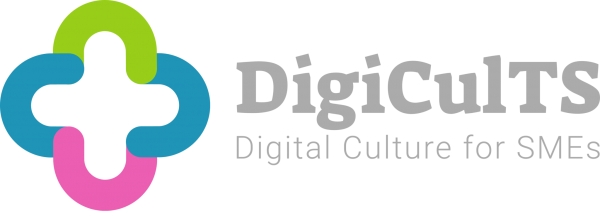Digital transformation: It is more about the digital implications of its elements, rather than the elements themselves!
Working together for one and half year so far in the DigiCulTS project (Co-funded by the Erasmus+ Programme of the European Union) is an exciting journey in exploring what digital transformation is all about! A goal? A practice? An imperative even, for businesses and organizations to remain relevant? What is exactly transformed and into what? Is it a (digital) transformation of business processes (the function) that comes first, or of the business “architecture” (the form) that would eventually lead to the transformation of processes? Or both at the same time?
During the DigiCulTS project we have done research, we reached out directly to SMEs and their workforce at all levels, we jointly explored and are still exploring what it really takes for an enterprise to begin to transform or widen the digital transformation process, already taking place within the company. An interesting aspect in that quest – equally important for the businesses and us in the DigiCulTS partnership, supporting them to realize the digital shift – is understanding that the elements of digital transformation themselves are the very same elements that make up the “architecture” (the form) of a business itself. It is however the digital implications of these elements, that a business should focus on to enter a digital transformation process. Let’s have a closer look at this, by demonstrating business and digital transformation elements head-to-head with their digital implications!
Business culture
Data, information, collaboration, all that is created by the human factor, “imported” to and “exported” from a business environment is increasingly based on a new sharing foundation, increasingly enabled by digital tools for storing, processing, sharing it.
Knowledge
Company knowledge and know-how becomes more and more digitized. Along the way, it becomes more customized and personalized and can be highly transferrable.
Competence
Individuals as well as the entire organisation or business enter a continuous learning process to acquire digital skills and further develop them to stay in touch with what digital technologies can offer to their benefit and advantage.
Decision making
Labor-intensive patterns and activities are waning. Automation, digitization (converting the analog “world” as we know it into a digital one) and digitalization (using digital technologies to “get the work done”), pose a new mission for the companies. The focus, in terms of decision-making, shifts to more abstract and complex territories!
Employee and workforce leadership
Along a transformation process towards building a digital culture, leadership skills of the employees and managers, the entire workforce of a company, acquire new content and meaning. Communication, creativity, vision, enthusiasm, motivation above all, have to align with the digital transformation process as the new competitive edge of a company.
Considering this aspect - the digital implications at the point where digital transformation elements and business architecture elements meet – throws us back in the original goal of the DigiCulTS project “…to support SMEs to find their place in the digital society”. This is the entry point of our support and training intervention to help SMEs come to terms with digital transformation as a goal from their own standpoint as it looks now, and as it can be transposed to a more advantaged point, to fully develop a digital culture philosophy, attitude and everyday practices.
Kyriakos Lingas / Militos Consulting SA,Greece / DigiCulTS project partner
Follow our Hashtag #digicults on Facebook, Linkedin, Twitter and Instagram.
Visit our website: www.digicults.eu
follow our Facebook page @digicultsforSME!

The European Commission support for the production of this publication does not constitute an endorsement of the contents which reflects the views only of the authors, and the Commission cannot be held responsible for any use which may be made of the information contained therein.

